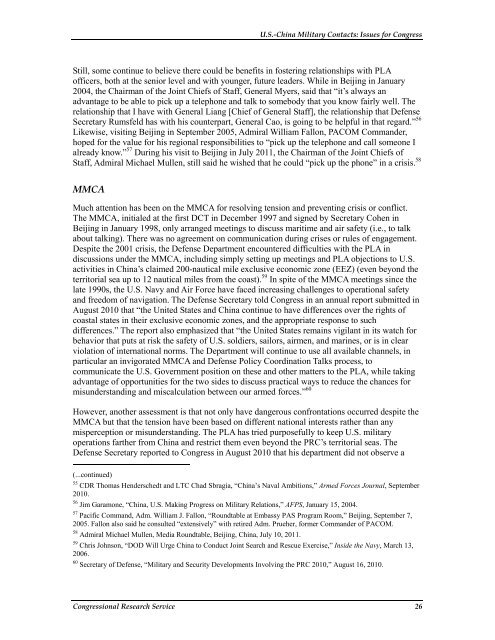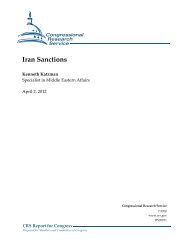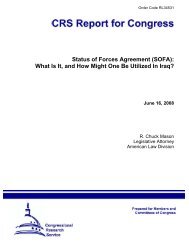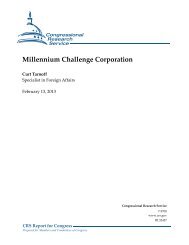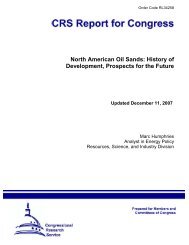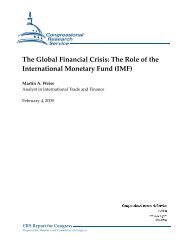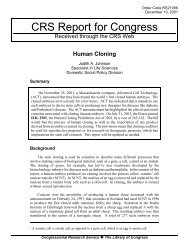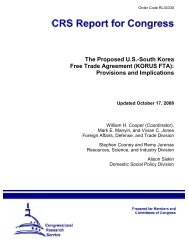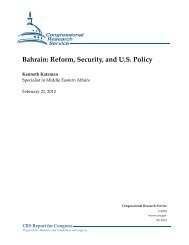U.S.-China Military Contacts: Issues for Congress - Foreign Press ...
U.S.-China Military Contacts: Issues for Congress - Foreign Press ...
U.S.-China Military Contacts: Issues for Congress - Foreign Press ...
You also want an ePaper? Increase the reach of your titles
YUMPU automatically turns print PDFs into web optimized ePapers that Google loves.
U.S.-<strong>China</strong> <strong>Military</strong> <strong>Contacts</strong>: <strong>Issues</strong> <strong>for</strong> <strong>Congress</strong><br />
Still, some continue to believe there could be benefits in fostering relationships with PLA<br />
officers, both at the senior level and with younger, future leaders. While in Beijing in January<br />
2004, the Chairman of the Joint Chiefs of Staff, General Myers, said that “it’s always an<br />
advantage to be able to pick up a telephone and talk to somebody that you know fairly well. The<br />
relationship that I have with General Liang [Chief of General Staff], the relationship that Defense<br />
Secretary Rumsfeld has with his counterpart, General Cao, is going to be helpful in that regard.” 56<br />
Likewise, visiting Beijing in September 2005, Admiral William Fallon, PACOM Commander,<br />
hoped <strong>for</strong> the value <strong>for</strong> his regional responsibilities to “pick up the telephone and call someone I<br />
already know.” 57 During his visit to Beijing in July 2011, the Chairman of the Joint Chiefs of<br />
Staff, Admiral Michael Mullen, still said he wished that he could “pick up the phone” in a crisis. 58<br />
MMCA<br />
Much attention has been on the MMCA <strong>for</strong> resolving tension and preventing crisis or conflict.<br />
The MMCA, initialed at the first DCT in December 1997 and signed by Secretary Cohen in<br />
Beijing in January 1998, only arranged meetings to discuss maritime and air safety (i.e., to talk<br />
about talking). There was no agreement on communication during crises or rules of engagement.<br />
Despite the 2001 crisis, the Defense Department encountered difficulties with the PLA in<br />
discussions under the MMCA, including simply setting up meetings and PLA objections to U.S.<br />
activities in <strong>China</strong>’s claimed 200-nautical mile exclusive economic zone (EEZ) (even beyond the<br />
territorial sea up to 12 nautical miles from the coast). 59 In spite of the MMCA meetings since the<br />
late 1990s, the U.S. Navy and Air Force have faced increasing challenges to operational safety<br />
and freedom of navigation. The Defense Secretary told <strong>Congress</strong> in an annual report submitted in<br />
August 2010 that “the United States and <strong>China</strong> continue to have differences over the rights of<br />
coastal states in their exclusive economic zones, and the appropriate response to such<br />
differences.” The report also emphasized that “the United States remains vigilant in its watch <strong>for</strong><br />
behavior that puts at risk the safety of U.S. soldiers, sailors, airmen, and marines, or is in clear<br />
violation of international norms. The Department will continue to use all available channels, in<br />
particular an invigorated MMCA and Defense Policy Coordination Talks process, to<br />
communicate the U.S. Government position on these and other matters to the PLA, while taking<br />
advantage of opportunities <strong>for</strong> the two sides to discuss practical ways to reduce the chances <strong>for</strong><br />
misunderstanding and miscalculation between our armed <strong>for</strong>ces.” 60<br />
However, another assessment is that not only have dangerous confrontations occurred despite the<br />
MMCA but that the tension have been based on different national interests rather than any<br />
misperception or misunderstanding. The PLA has tried purposefully to keep U.S. military<br />
operations farther from <strong>China</strong> and restrict them even beyond the PRC’s territorial seas. The<br />
Defense Secretary reported to <strong>Congress</strong> in August 2010 that his department did not observe a<br />
(...continued)<br />
55<br />
CDR Thomas Henderschedt and LTC Chad Sbragia, “<strong>China</strong>’s Naval Ambitions,” Armed Forces Journal, September<br />
2010.<br />
56<br />
Jim Garamone, “<strong>China</strong>, U.S. Making Progress on <strong>Military</strong> Relations,” AFPS, January 15, 2004.<br />
57<br />
Pacific Command, Adm. William J. Fallon, “Roundtable at Embassy PAS Program Room,” Beijing, September 7,<br />
2005. Fallon also said he consulted “extensively” with retired Adm. Prueher, <strong>for</strong>mer Commander of PACOM.<br />
58<br />
Admiral Michael Mullen, Media Roundtable, Beijing, <strong>China</strong>, July 10, 2011.<br />
59<br />
Chris Johnson, “DOD Will Urge <strong>China</strong> to Conduct Joint Search and Rescue Exercise,” Inside the Navy, March 13,<br />
2006.<br />
60<br />
Secretary of Defense, “<strong>Military</strong> and Security Developments Involving the PRC 2010,” August 16, 2010.<br />
<strong>Congress</strong>ional Research Service 26


